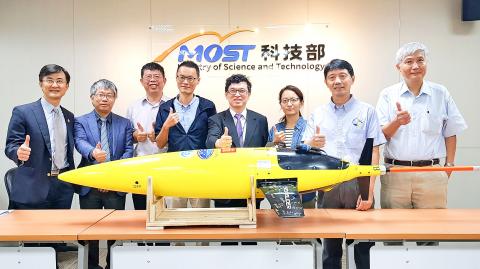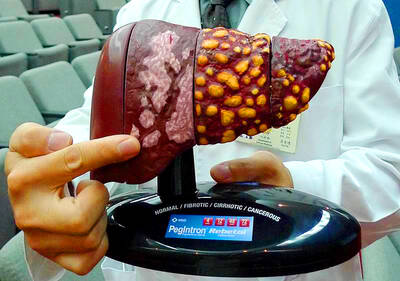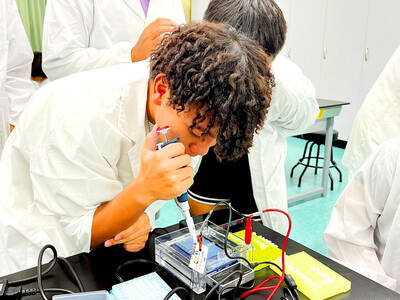A team of oceanographers from National Taiwan University (NTU) yesterday unveiled the first observations of the Kuroshio Current’s interleaving structures made using a Seaglider, a US-made uncrewed underwater vehicle that they hope will usher in a new era for oceanography studies in Taiwan.
While layered hydrographic structures are often observed in waters with less velocity, such as in the Arctic Ocean and currents near the equator, the team is the first to document such structures in the Kuroshio east of Taiwan, NTU Institute of Oceanography director Jan Sen (詹森) told a news conference at the Ministry of Science and Technology in Taipei.
As part of its long-term observations of the Kuroshio since 2012, the team operated a Seaglider to complete 434 dives down to a depth of 1,000m from December 2016 to March 2017 and obtained high-resolution hydrographic data, Jan said.

Photo: Chien Hui-ju, Taipei Times
They found that two dissimilar water masses within the 500m to 800m part of the Kuroshio do not blend quickly; rather, their contact gives rise to interleaving layers with varying salinity levels and temperatures, revolutionizing their concepts about the Kuroshio, the hydrological layers of which are not as smooth as they had presumed, he said.
The layered underwater structures would not affect rescue efforts, maritime construction or the operation of submarines, as the missions mostly occur 100m to 200m underwater, he said.
The team detailed their findings in a paper published in the journal Scientific Reports on Aug. 6.
It was the first time that Taiwanese oceanographers have made their own Seaglider observations, Jan said.
Thanks to the ministry’s funding, the institute purchased the nation’s two Seagliders for NT$6.5 million (US$209,252) each, he said, adding that he needed “export licenses” from the US Department of Commerce to import the vehicles due to the sensitive nature of the procurements.
Able to work in water for up to nine months, the energy-efficient Seagilders enabled the team to learn more about the ocean and improved global climate change projections using fewer personnel, he said, adding that team members had to constantly monitor the vehicles online.
Coupled with the institute’s buoys for monitoring typhoons and the nation’s ocean research vessels, the gliders would bring Taiwanese oceanography to a new level with increasing demand for driverless vehicles, Jan said.
Even the nation’s military cannot purchase such gliders, so it is significant that the institute has cultivated a team for operating the vehicles and managing related data, said Chiang Kuo-ping (蔣國平), convener of oceanography program under the ministry’s Department of Natural Sciences and Sustainable Development.
Chiang said that a similar vehicle once caused tension between China and the US when a Chinese naval vessel in 2016 intercepted a glider owned by a US survey ship in international waters near the Philippines, which was resolved after the Chinese government returned the glider to the US.
Data collected by the gliders are protected and regulated by the government, especially those collected within territorial waters, Jan added.
The team is also part of the global OceanGliders Boundary Ocean Observing Network set up by the Joint Technical Commission for Oceanography and Marine Meteorology, an intergovernmental body under UNESCO and the World Meteorological Organization.

The Taipei Summer Festival is to begin tomorrow at Dadaocheng Wharf (大稻埕), featuring four themed firework shows and five live music performances throughout the month, the Taipei Department of Information and Tourism said today. The festival in the city’s Datong District (大同) is to run until Aug. 30, holding firework displays on Wednesdays and the final Saturday of the event. The first show is scheduled for tomorrow, followed by Aug. 13, 20 and 30. To celebrate the 30th anniversary of Disney Pixar's movie Toy Story, the festival has partnered with Walt Disney Co (Taiwan) to host a special themed area on

BE CAREFUL: The virus rarely causes severe illness or death, but newborns, older people and those with medical conditions are at risk of more severe illness As more than 7,000 cases of chikungunya fever have been reported in China’s Guangdong Province this year, including 2,892 new cases last week, the Centers for Disease Control (CDC) yesterday said it is monitoring the situation and considering raising the travel notice level, which might be announced today. The CDC issued a level 1 travel notice, or “watch,” for Guangdong Province on July 22, citing an outbreak in Foshan, a manufacturing hub in the south of the province, that was reported early last month. Between July 27 and Saturday, the province reported 2,892 new cases of chikungunya, reaching a total of 7,716

STAY VIGILANT: People should reduce the risk of chronic liver inflammation by avoiding excessive alcohol consumption, smoking and eating pickled foods, the physician said A doctor last week urged people to look for five key warning signs of acute liver failure after popular producer-turned-entertainer Shen Yu-lin (沈玉琳) was reportedly admitted to an intensive care unit for fulminant hepatitis. Fulminant hepatitis is the rapid and massive death of liver cells, impairing the organ’s detoxification, metabolic, protein synthesis and bile production functions, which if left untreated has a mortality rate as high as 80 percent, according to the Web site of Advancing Clinical Treatment of Liver Disease, an international organization focused on liver disease prevention and treatment. People with hepatitis B or C are at higher risk of

FINE PRINT: Parents should carefully evaluate offers from cram schools that are designed to lower the amount they have to refund later, a New Taipei City official said New Taipei City Consumer Protection Office Director Wang Chih-yu (王治宇) urged parents to check contract content and institutional operations before sending children to cram schools, enrichment classes or day care centers during summer vacation. Closures and refund problems most commonly occur in cram schools, especially language cram schools, many of which have been facing difficulties due to the popularity of online learning apps and studying abroad, Wang said. Cram schools that closed due to financial issues were often unable to refund tuition fees, he said. Under Article 24 of the Rules for the Establishment and Management of Short-term Supplementary Learning Centers (短期補習班設立及管理準則), cram